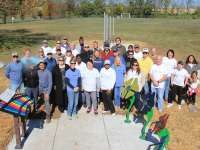Play is instinctive in humans and animals and suppressing the instinct to play is actually harmful. Without play, children and adults are more vulnerable to depression, anxiety, impulsivity, and sedentarism. Our creativity, ingenuity, and willingness to work cooperatively are also limited when play is not present in our lives. However, if we are safe, otherwise healthy, and well-fed, play can actually bubble up spontaneously in its wide variety and highly individual patterns, from infancy to old age. Play strengthens the mind and body, straightening the path toward social competency, emotional stability, physical capacity, and success. All people play, and lack of play limits how we interact with the world around us and our capacity to shape it. There is increasing mastery that is part of early play and that helps humans cope with an ever-changing world (economic, climate, etc.).
For many years, charrette-style engagement invited participants to pick up a pencil and draw their ideas. The outcome often included a large group of people who felt intimidated by the request to draw, so rarely would. While the designers see pencils as a tool to “scribble and play around”, often the general public sees themselves as not skilled at making marks on paper and therefore do not. Designers are trained to see and understand a wide range of drawing types, and these drawings are included in engagement presentations even when the public has very little experience with or understanding of them. Computer-generated illustrations can create the impression that a design is further along than it is in reality, making it hard for the community to object or feel that their input will have any impact on the outcome. Information sessions also often rely on digital presentations and open microphone opportunities rather than real conversations.
When we move from a language of drawing and presentation to a language of play, the community CAN imagine situations they have never encountered before and share what they see as possible, as well as envision obstacles to what is possible. They can see connections that find their way into their everyday lives and most importantly, they can try on possibility without risk. Avoiding risk and the fear of failure is what is often heard from community members in opposition to a project, even when the project is intended to support improvements to their basic infrastructures. For these groups, play could create a major breakthrough in how they see themselves, as well as how they imagine the project would impact their lives.
Play research shows that every human plays, regardless of age, ability, culture, or language. It is likely our earliest language, both as individuals and as a species. Play is a very interesting beginning place for community engagement, because when one is playing, one is involved as a collaborative problem solver.
There is also something profoundly important that is created in play. As noted in the barriers to present day engagement, trust is the fundamental requirement for any relationship to be successful. So, why would the world of design be any different? Owners or municipalities often say, “We don’t want to spend a lot of time on engagement, they have no idea what is needed or what we want to do.” or “everything they want to do is unrealistic or expensive.” On the flip side, communities say, “Why should I believe you, you ask my opinion all the time and you never listen.” or “You just do what you want to anyway. We are only here to check the box.” There is absolutely NO TRUST in those experiences. How could engaging there ever be successful?
However, through play we find common language, common interest, and common concern. We can come from being related. We can trust. Additionally, in play, we create empathy. Empathy is REQUIRED for communities and individuals as they explore what possibilities are available to empower ALL through the design of WHATEVER it is that is being considered. Empathy allows a group to see beyond their individual self and come to a consensus, even if it is not unanimous.
In recent decades there has been an explosion of information emerging from social, psychological, behavioral, and biological sciences all citing the benefits of play, and we believe the design of our public realm can benefit as well. Playful placemaking includes four primary types of play and engagement models to empower communities and innovate the built environment:
Community Conversations
- Go to where people already are
- Ask compelling questions
- Include engaging activities
- Make it fun for all ages
Site Analysis Tours
- People power: walking, biking, boating
- Invite ALL stakeholders to walk together
- Play along the way; discover possibilities and barriers together
Team Building Games
- Key tools in building trust, empathy and collaboration
- Specifically crafted for project needs
- Value in a variety of both physical and thinking games
Trying It On
- Test designs in real time
- Low cost, quick, and temporary
- Fun and festive atmosphere
- Create programming to showcase the potential impact of the project



